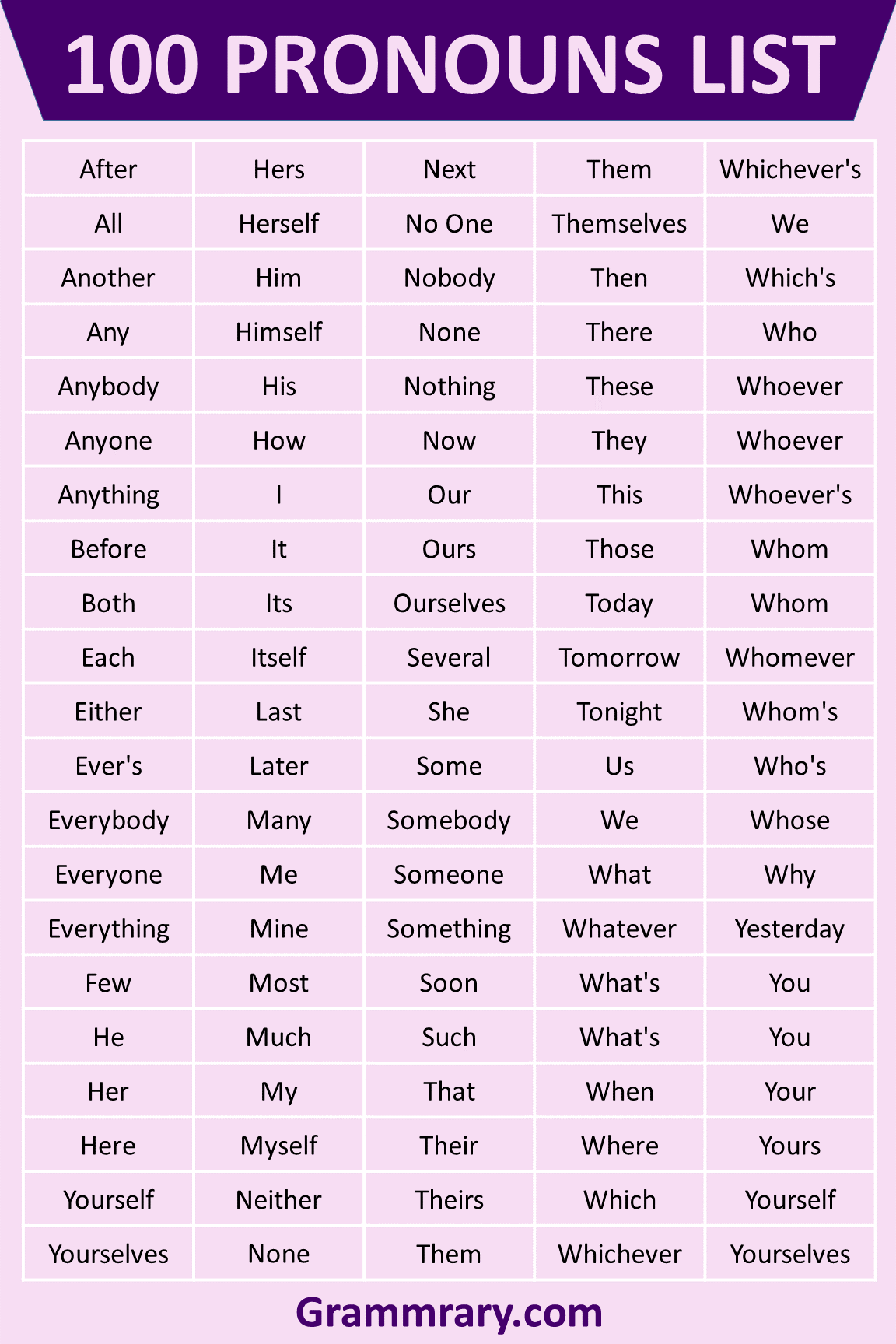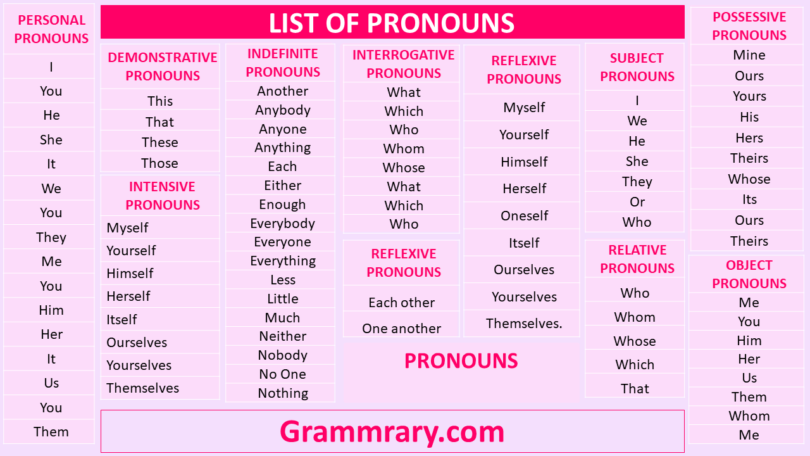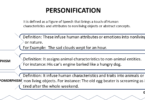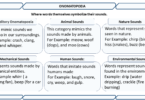The pronouns play the most vital role in grammar and communication. Imagine any sentence you talk or hear today in your surroundings. Did it make sense without pronouns? Today we will learn the List of Pronouns in English, the Use of Pronouns, and their Types. Did you question the importance of pronouns? The repetitive use of nouns makes the content, speech, or writing boring and wordy. Here comes “Pronoun.” Learn What is Pronoun, Types of Pronoun, Pronoun Examples and use of Pronouns in Sentences.
What is a Pronoun?
The pronoun replaces a noun or noun phrase. It is used to mention a modified noun or one that does not need to give a specific name. Pronouns eliminate the repetition of the same nouns over and over. A pronoun is a word that stands in for a noun, often to avoid the need to repeat the same noun over and over. Pronouns represent individuals, objects, ideas, and locations as nouns do.
Examples of Pronouns:
Following are the most commonly used examples of pronouns.
- I
- We
- He
- You
- She
- They
- It
- Are
- Your
- My
- Myself
- himself
- Yourself
- Herself
- Ourselves
- Itself
- Themselves
Examples of Pronouns in Sentences
Let’s explore the use of pronouns. Here are examples of Pronouns in sentences.
| She went to the University | Personal |
| That is her car. | Demonstrative |
| That is the boy who I met at the market. | Relative |
| Some people don’t like coffee. | Indefinite |
| What is your favorite food? | Interrogative |
| This is my bag. | Possessive |
| She made the cake herself. | Reflexive |
| She went to the market. | Subject |
| I bought a new book for you. | Object |
| They supported each other. | Reciprocal |
List of Pronouns, Types with Definitions & Examples:
Below is the list of all types of Pronouns. This will help you excel in pronouns.
List of Personal Pronouns:
Personal pronouns are used to refer to people and animals.
These include:
- I
- You
- He
- She
- It
- We
- You
- They
- Me
- You
- Him
- Her
- It
- Us
- You
- Them
| Subject | Object |
|---|---|
| I | me |
| you | you |
| he | him |
| she | her |
| it | it |
| we | us |
| you | you |
| they | them |
List of Demonstrative Pronouns:
Demonstrative Pronouns point out and demonstrate specific things.
- This
- That
- These
- Those
| Singular Demonstrative Pronouns |
|
| Plural Demonstrative Pronouns |
|
List of Relative Pronouns:
Relative Pronouns present dependent clauses in sentences. Here is a list:
- Who
- Whom
- Whose
- Which
- That
List of Indefinite Pronouns:
Indefinite Pronouns refer to unspecified things or people.
- Another
- Anybody
- Anyone
- Anything
- Each
- Either
- Enough
- Everybody
- Everyone
- Everything
- Less
- Little
- Much
- Neither
- Nobody
- No OneNothing
- OneOther
- Somebody
- Someone
- Something
- You
- All
- Any
- Few
- Many
- None
- Several
- Some
List of Interrogative Pronouns:
The Interrogative Pronouns interrogate and ask questions. Explore the below list of pronouns; interrogative pronouns.
- What
- Which
- Who
- Whom
- Whose
List of Possessive Pronouns:
These show ownership or possession.
- Mine
- Ours
- Yours
- His
- Hers
- Theirs
- Whose
- Its
- Ours
- Theirs
List of Reflexive Pronouns:
Reflexive pronouns refer back to the subject in the sentence.
- Myself
- Yourself
- Himself
- Herself
- Oneself
- Itself
- Ourselves
- Yourselves
- Themselves.
| Singular Reflexive Pronouns | Myself, Yourself, Himself, and Herself |
| Plural Reflexive Pronouns | Ourselves and Themselves. |
| Gender-Neutral Reflexive Pronouns | Itself |
List of Subject Pronouns
It is defined as the subject of a verb. The Subject performs the action, it can be any person or thing. Do Practice to excel in Subject Pronouns.
- I
- We
- He
- She
- They
- Or
- Who
List of Object Pronouns
The type of Pronouns to which action is happening. List of Pronouns of these types include:
- Me
- You
- Him
- Her
- Us
- Them
- Whom
List of Reciprocal Pronouns:
Reciprocal pronouns indicate reciprocal or mutual relationships. It shows the relationship between two subjects or objects.
- Each other
- One another
List of Intensive Pronouns:
Intensive Pronouns emphasize nouns or pronouns. It has three types, singular, plural, and gender-neutral.
- Myself
- Yourself
- Himself
- Herself
- Itself
- Ourselves
- Yourselves
- Themselves
| Singular Intensive Pronouns | Myself, Yourself, Himself, and Herself |
| Plural Intensive Pronouns | Ourselves and Themselves |
| Gender-Neutral Intensive Pronouns | Itself |

Types of Pronouns, With a Complete list
100 Pronouns in English:
- I
- He
- You
- She
- They
- We
- It
- Her
- Them
- You
- Me
- Him
- Us
- Yourself
- Ourselves
- Yours
- Himself
- Themselves
- Myself
- Herself
- Itself
- Yourselves
- Mine
- Theirs
- Your
- Hers
- His
- Ours
- Its
- My
- Our
- This
- Their
- That
- Those
- Whom
- Who
- These
- Which
- Whose
- Whom
- Ever’s
- Whoever’s
- Whichever’s
- What
- Whomever
- Whoever
- Whatever
- Whichever
- What’s
- Whoever
- When
- Where
- Here
- Now
- There
- Then
- Soon
- Later
- Today
- Which’s
- Tonight
- What’s
- Who’s
- Why
- Whom’s
- How
- Yesterday
- Tomorrow
- Before
- Next
- After
- Last
- Another
- All
- Any
- Anyone
- Anybody
- Anything
- Each
- Both
- Either
- Much
- Most
- Neither
- None
- Nobody
- No One
- Such
- Several
- Nothing
- Some
- Someone
- Somebody
- Something
- Everybody
- Everything
- Everyone
- Few
- Many

List of 100 Pronouns







